Shaping the future of mobility, Experion Technologies brings together technology and expertise to build transportation software development solutions for a sustainable tomorrow.
The transportation industry is the backbone of global trade, urban mobility, and logistics. Every package delivered, every fleet on the move, and every city’s public transport system depends on seamless coordination to keep economies and communities thriving. As customer expectations shift toward real-time visibility, faster delivery, and greener solutions, businesses are under immense pressure to adapt.
This is where a trusted transportation software development company makes all the difference. Through advanced transportation software development services, ranging from fleet management platforms to route optimization tools, organizations can tackle rising operational costs, ensure compliance, and boost sustainability efforts. Unlike generic solutions, custom transportation software development enables enterprises to integrate cloud, mobile, IoT, and AI capabilities tailored to their specific challenges, making operations not just smarter but also future-ready.
Whether it’s streamlining transportation and logistics software development for global supply chains or building mobile-first platforms for urban transit, technology is shaping the way we move people and goods. The future belongs to businesses that harness these innovations to unlock efficiency, transparency, and resilience.
Your journey to efficient, future-ready transportation software begins here.
Browse the Sections:
- Understanding Transportation Software Development
- Core Challenges in the Transportation Industry
- Cost Factors in Transportation Software Development
- Key Features of Modern Transportation Software
- Emerging Technologies Driving Transportation Software
- Benefits of Transportation Software Development
- Custom Transportation Software Development vs. Off-the-Shelf Solutions
- Industries Leveraging Transportation Software
- Steps in the Transportation Software Development Process
- How to Choose a Transportation Software Development Partner?
- Security and Compliance in Transportation Software
- Future of Transportation Software Development
- How Experion Can Help in Developing Transportation Software?
- Conclusion
- Key Takeaways
Understanding Transportation Software Development
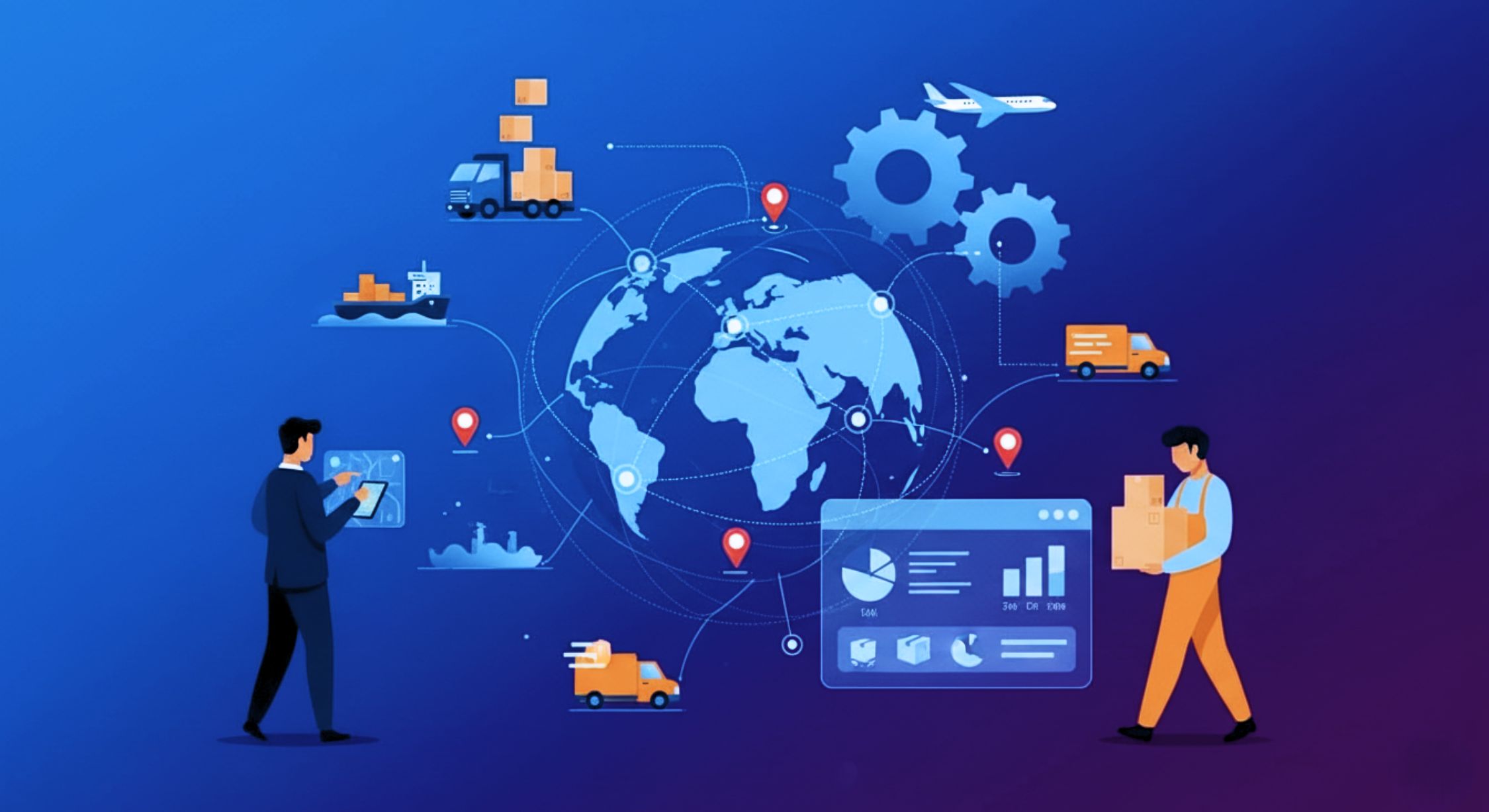
Transportation software development focuses on building digital solutions that optimize and automate every aspect of transportation and logistics operations. From planning and execution to real-time monitoring, these solutions help businesses achieve efficiency, safety, and reliability at scale.
A transportation software development company like Experion doesn’t just provide generic tools, it designs platforms tailored to specific business needs, industry challenges, and long-term goals. By combining technology with domain expertise, organizations can unlock smarter workflows, reduce costs, and deliver superior customer experiences.
Key Categories of Transportation Software
- Logistics Management Software: Manages freight, shipments, and warehouse operations to streamline end-to-end logistics.
- Fleet Management Software: Tracks and maintains vehicles, drivers, and fuel consumption for better utilization.
- Route Optimization Software: Analyzes traffic, distance, and delivery schedules to recommend the fastest and most cost-efficient routes.
- Public Transportation Apps: Enhance urban mobility by providing commuters with real-time updates, ticketing systems, and schedule tracking.
- Supply Chain Integration Platforms: Bridge gaps between manufacturers, distributors, and retailers by ensuring smooth data flow and transparency.
Role of Cloud, Mobile, and AI in Modern Transportation Software
Modern transportation and logistics rely heavily on advanced technologies to stay competitive. Cloud computing provides scalability, flexibility, and the ability to connect global networks without heavy infrastructure costs. Mobile platforms ensure that drivers, managers, and customers have instant access to critical information on the go. Meanwhile, AI-powered systems offer predictive insights, such as anticipating delays, optimizing delivery schedules, and even automating decision-making. Together, these technologies make transportation and logistics software development more adaptive, efficient, and future-ready.
Core Challenges in the Transportation Industry
The transportation sector is essential to global commerce and urban mobility, but it faces several pressing challenges:
- Traffic Congestion and Inefficient Routing: Growing urbanization and increased freight movement often result in delays and inefficiencies.
- Rising Fuel and Operational Costs: Businesses struggle to manage high fuel prices, fluctuating operational expenses, and vehicle maintenance.
- Demand for Sustainability: Customers and regulators expect eco-friendly solutions, pushing companies to adopt greener transport practices.
- Compliance and Safety Regulations: Adhering to local and international standards for driver safety, vehicle maintenance, and cargo handling is critical.
- Data Silos Across Logistics Networks: Disconnected systems prevent real-time decision-making and create inefficiencies across the supply chain.
- Customer Expectations for Real-Time Visibility: End users now demand instant updates on shipment status, delivery times, and transport schedules.
By addressing these challenges with intelligent, integrated systems, custom transportation software development empowers businesses to modernize operations, enhance sustainability, and meet rising customer expectations.
Cost Factors in Transportation Software Development
 Investing in transportation software development services requires careful consideration of multiple factors that directly impact cost and long-term value. Organizations must look beyond initial budgets and understand what shapes the overall investment.
Investing in transportation software development services requires careful consideration of multiple factors that directly impact cost and long-term value. Organizations must look beyond initial budgets and understand what shapes the overall investment.
- Type of Solution: The complexity of the application plays a big role. For example, a fleet management system typically involves vehicle tracking, driver management, and reporting, whereas a ride-hailing app requires advanced real-time matching, payment gateways, and customer-facing interfaces.
- Features and Integration Needs: The more advanced the feature set, such as predictive analytics, IoT integration, or automated billing, the higher the development cost. Integration with existing enterprise systems like ERP and CRM also influences pricing.
- Real-Time Processing and GPS Tracking Complexity: Building robust custom transportation software development solutions that deliver accurate real-time location data, traffic updates, and route optimization requires sophisticated algorithms and processing power.
- Development Team Setup: Costs vary depending on whether businesses choose an offshore development partner, an in-house team, or a hybrid model. Many enterprises turn to a trusted transportation software development company to balance expertise with cost efficiency.
- Ongoing Scaling and Maintenance Costs: After deployment, continuous support, updates, and scalability are crucial. Future-proof transportation and logistics software development ensures that solutions adapt to evolving business needs without excessive reinvestment.
By understanding these cost factors, companies can better plan their digital transformation journeys and ensure maximum ROI from their software investments.
Transform challenges into opportunities.
Connect with our experts today!
Key Features of Modern Transportation Software
Modern transportation software development solutions are designed with flexibility, intelligence, and scalability in mind. The right feature set not only enhances day-to-day operations but also ensures long-term competitiveness.
- Real-Time GPS Tracking: Provides accurate location updates, enabling better fleet visibility and customer transparency.
- Dynamic Route Planning and Optimization: Analyzes live traffic, weather, and delivery schedules to identify the most efficient paths, reducing delays and fuel consumption.
- Driver Management and Safety Monitoring: Tracks driver behavior, compliance, and working hours to improve safety and reduce risks.
- Predictive Maintenance with IoT Integration: Monitors vehicle health using sensors and telematics, preventing costly breakdowns and downtime.
- Automated Billing and Invoicing: Simplifies financial processes by automating payments, receipts, and invoicing, reducing manual errors.
- ERP and CRM Integrations: Ensures smooth collaboration between transportation systems and existing enterprise tools for a unified workflow.
- Advanced Analytics and Reporting: Converts raw transport and logistics data into actionable insights for better decision-making.
- Mobile-First Design: Offers accessibility on the go for drivers, managers, and customers, improving overall responsiveness.
Incorporating these features into custom transportation software development allows businesses to modernize operations, enhance efficiency, and deliver better customer experiences across logistics, mobility, and public transport ecosystems.
Emerging Technologies Driving Transportation Software
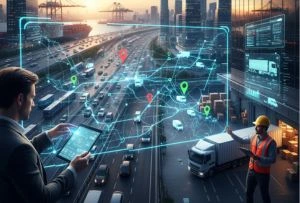 The future of transportation software development is being shaped by breakthrough technologies that make mobility smarter, safer, and more connected. Businesses that adopt these innovations early can gain a strong competitive advantage in the evolving transportation landscape.
The future of transportation software development is being shaped by breakthrough technologies that make mobility smarter, safer, and more connected. Businesses that adopt these innovations early can gain a strong competitive advantage in the evolving transportation landscape.
- Artificial Intelligence and Machine Learning: AI-powered algorithms enable demand forecasting, predictive scheduling, and advanced route optimization. ML models learn from historical data to reduce inefficiencies and improve delivery performance.
- IoT and Telematics: Connected vehicles equipped with IoT sensors provide real-time insights into fuel usage, driver behavior, and vehicle health. This enables predictive maintenance that minimizes downtime and lowers operational costs.
- Blockchain Technology: With its secure and transparent framework, blockchain ensures reliability in freight transactions, supply chain contracts, and cargo tracking. It reduces fraud and enhances accountability.
- Cloud Computing: Modern transportation and logistics software development relies on cloud platforms for scalability and global accessibility. Businesses can expand operations without heavy infrastructure investments.
- AR and VR Solutions: Augmented and virtual reality are transforming training programs for drivers and warehouse staff by simulating real-world scenarios, reducing risk, and improving readiness.
- 5G and Edge Computing: Ultra-fast connectivity allows seamless real-time communication between vehicles, logistics hubs, and management platforms, making connected and autonomous mobility a reality.
Benefits of Transportation Software Development
Adopting custom transportation software development services empowers organizations to modernize operations, increase profitability, and deliver better customer experiences. Key benefits include:
- Streamlined Operations and Higher Efficiency: Automated workflows reduce errors and speed up decision-making across logistics networks.
- Optimized Routes for Reduced Fuel Costs: Intelligent route planning lowers fuel consumption, cutting both expenses and carbon emissions.
- Enhanced Customer Experiences: Real-time tracking and delivery updates keep customers informed and engaged.
- Improved Compliance and Safety Monitoring: Integrated safety protocols help businesses meet regulatory standards while ensuring driver well-being.
- Smart Fleet Utilization: Better allocation of vehicles and resources maximizes productivity and reduces idle time.
- Sustainable Transportation Strategies: Eco-friendly practices such as green routing and electric vehicle tracking support corporate sustainability goals.
Custom Transportation Software Development vs. Off-the-Shelf Solutions
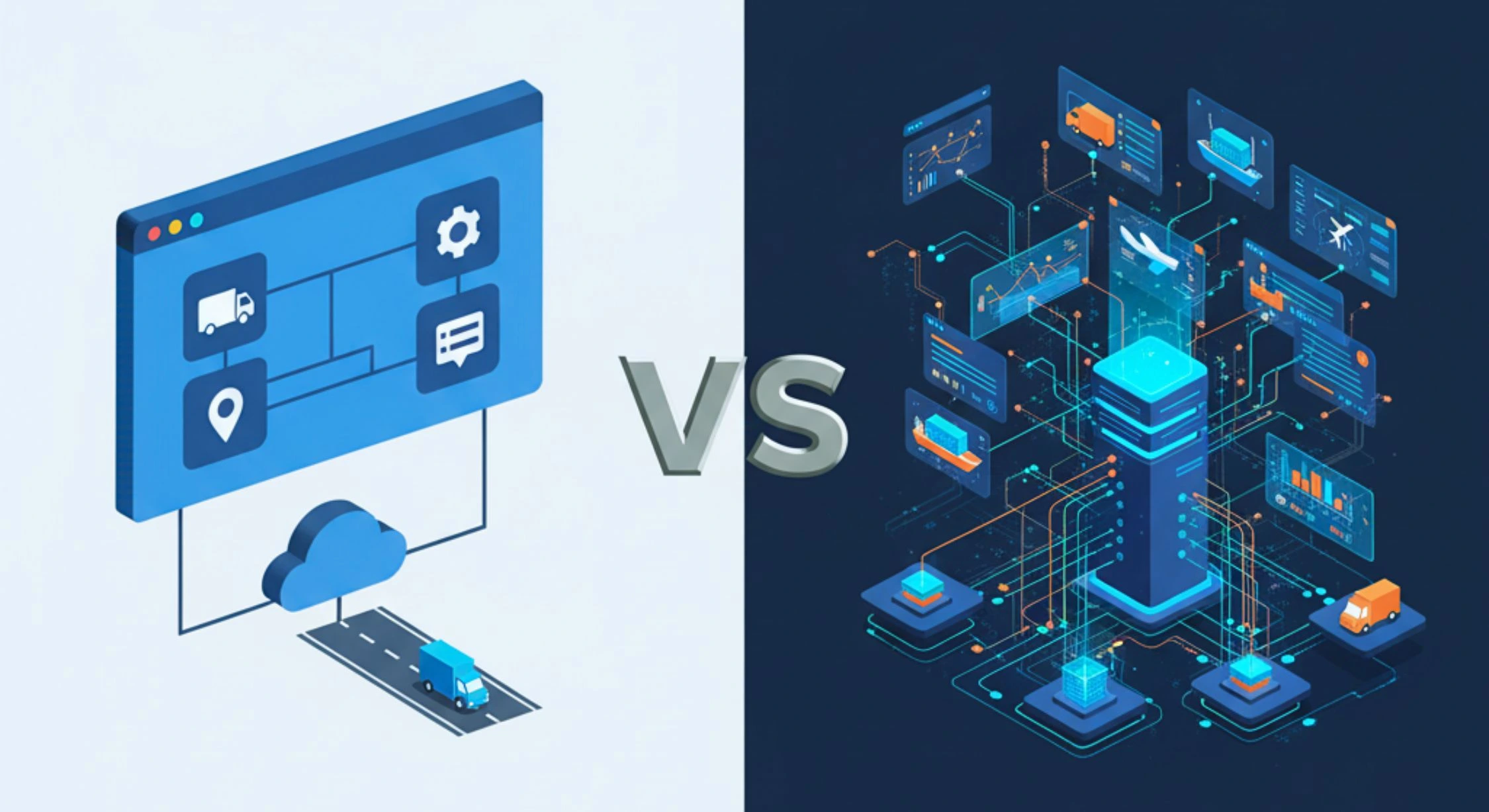
When choosing the right solution, businesses often face the decision between custom transportation software development and ready-made off-the-shelf platforms. Both approaches have advantages, but the choice depends on organizational needs, growth potential, and system compatibility.
- Custom Transportation Software Development: Provides fully tailored features that align with business goals. These solutions are highly scalable, integrate seamlessly with existing ERP and CRM systems, and evolve with the company’s long-term growth strategy.
- Off-the-Shelf Software: Offers quick deployment and lower upfront costs, making it attractive for smaller businesses or those with limited customization needs. However, flexibility is often restricted, and scaling can become a challenge.
Enterprises that prioritize innovation, scalability, and integration often benefit most from custom solutions. A trusted transportation software development company like Experion brings deep expertise, domain knowledge, and advanced technology capabilities to deliver future-ready transportation platforms that balance flexibility with innovation.
Industries Leveraging Transportation Software
Transportation software development solutions are not limited to a single sector. They have become indispensable across industries that rely on the movement of goods, people, and critical resources.
- Logistics and Freight Providers: Real-time fleet tracking, automated invoicing, and route optimization are crucial for companies handling global supply chains.
- Public Transit Systems: Mobile ticketing apps, passenger information systems, and scheduling platforms enhance urban mobility and improve commuter experiences.
- Ride-Hailing and Mobility Services: Custom transportation software development supports dynamic ride-matching, digital payments, and driver management systems for companies in the shared mobility space.
- E-commerce and Retail Supply Chains: Fast delivery expectations make route optimization, last-mile logistics, and warehouse integration essential.
- Healthcare Logistics: Ambulance dispatch systems, pharmaceutical supply tracking, and compliance-focused logistics help safeguard lives and sensitive medical goods.
- Construction and Manufacturing: Transportation and logistics software development ensures heavy equipment, raw materials, and finished products reach sites efficiently and safely.
By tailoring solutions to these sectors, a transportation software development company like Experion empowers businesses to increase efficiency and meet customer expectations with precision.
Ready to accelerate your digital journey in transportation?
Steps in the Transportation Software Development Process
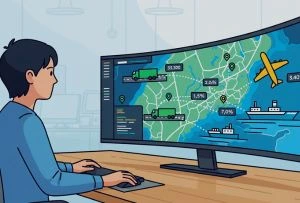 Developing a robust solution involves a structured process that balances innovation with business objectives. Each stage is critical for delivering reliable and scalable software.
Developing a robust solution involves a structured process that balances innovation with business objectives. Each stage is critical for delivering reliable and scalable software.
- Requirement Analysis and Business Discovery: Understanding operational challenges, customer expectations, and long-term goals.
- Wireframing and Intuitive UI/UX Design: Creating user-friendly designs that streamline navigation for managers, drivers, and customers.
- Tech Stack Selection: Choosing the right combination of cloud, mobile, AI, and IoT technologies to ensure scalability and adaptability.
- Backend and Frontend Development: Building the software’s functional core while ensuring seamless, responsive interfaces.
- Integration with GPS, ERP, and Payment Gateways: Connecting with third-party systems to deliver real-time data and smooth workflows.
- Testing for Security, Performance, and Usability: Ensuring reliability and resilience through rigorous quality checks.
- Deployment and Scaling: Launching the platform while enabling expansion as demand grows.
- Continuous Maintenance and Updates: Keeping systems current with evolving technologies, user feedback, and compliance requirements.
Following these steps helps businesses benefit from custom transportation software development services that meet industry-specific needs while maintaining scalability and efficiency
How to Choose a Transportation Software Development Partner?
Selecting the right transportation software development company is a critical decision that influences long-term success.
Key Considerations
- Proven Domain Expertise: Look for partners with experience in transportation, logistics, or supply chain systems.
- Ability to Scale Solutions: Ensure the provider can support both immediate needs and future expansion.
- Industry-Specific Knowledge: A partner with prior exposure to your industry can anticipate challenges and deliver tailored solutions.
Vendor Checklist
- Security-First Approach: Strong cybersecurity measures to safeguard sensitive data.
- Cloud Readiness: Infrastructure that supports remote access, scalability, and global operations.
- Performance-Driven Builds: Reliable software capable of handling high traffic and real-time processing.
- Reliable Support System: Ongoing maintenance, timely updates, and responsive issue resolution.
The ideal partner offers more than technology—they provide strategic guidance, innovation, and ongoing support to ensure your custom transportation software development project succeeds.
Security and Compliance in Transportation Software
Security and compliance are at the heart of transportation and logistics software development. Protecting data, adhering to regulations, and securing transactions are non-negotiable in today’s interconnected world.
- End-to-End Data Encryption: Protects sensitive information such as GPS data, financial transactions, and personal details from unauthorized access.
- Compliance with Transportation Standards and Regulations: Adherence to international and regional transportation laws ensures legal reliability and trustworthiness.
- Secure Financial and Payment Integrations: Safeguards online transactions within ride-hailing apps, freight platforms, and logistics systems, ensuring customer confidence.
By embedding these measures into every stage of custom transportation software development, businesses not only meet regulatory obligations but also strengthen customer trust and protect brand reputation.
Future of Transportation Software Development

The next wave of transportation software development is set to redefine how goods and people move across the globe. With rapid advances in digital technologies, businesses are preparing for smarter, greener, and more connected transportation ecosystems.
- AI-Powered Autonomous Logistics Systems: Artificial intelligence is driving automation in freight handling, autonomous vehicles, and self-learning logistics systems that minimize human intervention while maximizing efficiency.
- Eco-Friendly Smart Transport Networks: Sustainability is becoming a priority. Custom transportation software development now incorporates eco-routing, electric vehicle support, and carbon footprint tracking to promote green logistics.
- Connected Mobility Ecosystems in Smart Cities: As urban areas grow, transportation and logistics software development is enabling seamless integration of ride-hailing, public transport, and micro-mobility into one connected system.
- Predictive Analytics for Transportation Planning: Data-driven forecasting helps businesses plan routes, manage fleets, and allocate resources more effectively, turning analytics into a powerful decision-making tool.
The future of transportation software will not just improve efficiency but will also contribute to smarter cities and more sustainable economies.
How Experion Can Help in Developing Transportation Software?
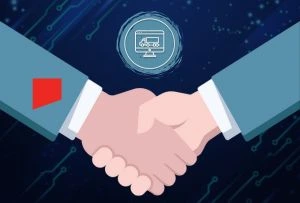
Experion Technologies brings together domain knowledge, innovation, and cutting-edge technology to deliver custom transportation software development services that create measurable business impact. From fleet management systems to intelligent route optimization tools, our solutions are built to empower organizations in navigating today’s challenges while preparing for tomorrow’s opportunities.
Case Study: How Experion Transformed a Logistics Company with Custom Transportation Software
When a leading logistics provider approached Experion Technologies, they had a clear challenge. Their fleet operations were growing rapidly, but outdated systems made it difficult to onboard drivers quickly, allocate loads efficiently, and keep operations transparent. They needed more than a generic tool. They needed a custom transportation software development solution built around their business goals.
Reimagining Driver Onboarding
We started with the drivers, the heart of any logistics network. Their onboarding process was time-consuming, manual, and inconsistent. Our team designed a mobile-first transportation management system that made onboarding as simple as downloading an app. Drivers could register, train, and get started on the road in record time. The result was not just faster onboarding but a more confident and engaged driver workforce.
Solving the Idle Fleet Problem
Idle fleets are costly, both financially and operationally. With our expertise in transportation and logistics software development, we introduced automated load allocation. The system intelligently matched drivers with available loads in real time. This minimized downtime, reduced empty miles, and gave managers complete visibility into fleet performance. Suddenly, every vehicle was working smarter, not harder.
Motivating Drivers with Built-In Incentives
Adoption of new systems often fails when users don’t see personal value. To counter this, we built an integrated incentive feature. Drivers could now see how their performance translated into rewards. This not only motivated them but also ensured high adoption of the new system across the organization.
The Impact
The transformation was immediate:
- Reduced Idle Time: Fleets stayed active, boosting overall efficiency.
- Faster Onboarding: New drivers became road-ready much quicker.
- High Adoption Rates: The combination of user-friendly design and incentives won over the driver community.
Why It Matters?
This project is a powerful example of how custom transportation software development services can solve challenges that off-the-shelf solutions simply cannot. By tailoring the platform to the company’s unique needs, we helped them achieve measurable improvements in efficiency, sustainability, and employee engagement.
At Experion, we take pride in being a trusted transportation software development company that builds solutions around people as much as processes. For us, it is not just about creating software; it is about creating impact.
Conclusion
Transportation software is no longer just a supporting tool; it is the foundation of modern mobility, logistics, and global trade efficiency. Companies that adopt custom transportation software development gain the agility to adapt, the intelligence to optimize, and the sustainability to thrive in competitive markets.
Key Takeaways
- Transportation software development is redefining global mobility, logistics, and supply chains.
- Emerging technologies like AI, IoT, blockchain, and cloud computing are shaping the future of connected transportation ecosystems.
- Custom transportation software development delivers tailored, scalable solutions that outperform generic off-the-shelf tools.
- Transportation software development services enable real-time visibility, optimized routing, predictive maintenance, and improved compliance.
- Transportation and logistics software development empowers industries from logistics and retail to healthcare and public transit.
- Choosing the right transportation software development partner is critical for ensuring scalability, innovation, and security.
- Experion’s proven expertise and people-first approach enable enterprises to design transportation platforms that are intelligent, resilient, and ready for tomorrow.
Experion is more than a development partner; we are a technology enabler committed to solving real-world challenges. From fleet management systems to digital freight marketplaces, we have successfully delivered solutions that improve operational performance, sustainability, and customer engagement. If your organization is ready to transform the way it manages transportation and logistics, Experion has the expertise to make it happen.

